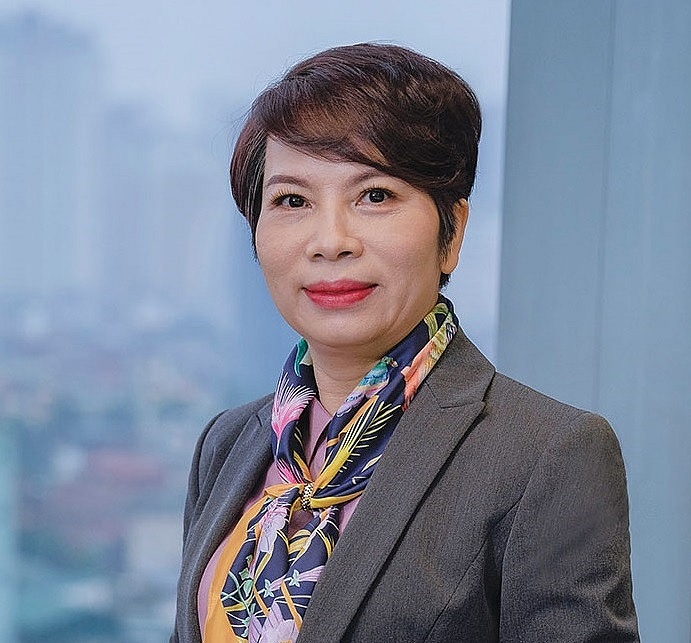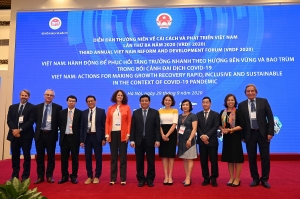The pressing need for globalised auditing standards
In today’s increasingly conscientious investment climate, mere commitments to sustainable development are insufficient. Enterprises must now grapple with a dual challenge: not only to initiate impactful sustainable actions, but also to navigate the stringent compliance demands of both legal frameworks and investors seeking enhanced quality and comprehensive reporting.
 |
| Tran Thi Thuy Ngoc, Audit partner; Risk Advisory leader Deloitte Vietnam |
A MSCI survey underscored this shift, revealing that 52 per cent of investors now follow responsible environmental, social, and governance (ESG) investment strategies. In more stark terms, among investors managing over $200 billion, a substantial 79 per cent have an active ESG policy in place.
This growing trend towards ESG adherence signals a larger, more systemic shift in the investment community – one where sustainability performance is as scrutinised as financial returns.
The landscape, however, is fraught with complexity. National regulations are proliferating, particularly for large and listed companies, to guide the disclosure of pertinent information. Simultaneously, international bodies are contributing to an expanding tapestry of standards.
This abundance leads to a regulatory labyrinth, with businesses, especially multinational conglomerates operating across diverse industries, finding themselves entangled in multiple reporting frameworks.
According to a study from the Chartered Institute of Management Accountants and others on sustainable development information disclosure and assurance released at the start of 2023, the proportion of companies navigating more than one sustainability reporting standard or framework rose sharply from 68 per cent in 2020 to 85 per cent in 2021.
This trend towards multi-framework adoption can dilute the effectiveness of sustainability disclosures, risking investment diversion and a misalignment with overarching sustainability goals. This backdrop underscores the pressing need for a globalised standard – a tool to harmonise various regulations, frameworks, and norms. The ISSB’s initiative steps into this breach, potentially simplifying the compliance matrix for businesses and fostering a shared language between enterprises and the investment community.
For Vietnamese companies, particularly, this development could be a game-changer, offering a clearer pathway to align with international standards and attract global investors.
By integrating these new standards, businesses are poised not only to streamline their sustainability reporting, but also to refocus their strategies towards more impactful and transparent sustainable practices. The alignment with a global standard could reduce the risk of fragmented efforts and position firms, especially in emerging markets like Vietnam, as more compelling and trustworthy in the eyes of international investors.
A critical leap has been made with the ISSB unveiling International Financial Reporting Standards (IFRS) S1 on general sustainability-related disclosures, and IFRS S2 on climate-related disclosures. This development heralds a pivotal milestone in establishing a unified reporting framework for quality sustainable development information globally, fostering a common language for corporate entities and investors in the capital market to engage more effectively.
Currently, Vietnam has introduced regulations and guidelines for sustainable development reporting for businesses. Yet, as Vietnamese firms continue their growth trajectory and strive to attract high-quality capital, particularly green capital, green bonds, or green loans, they face the need to align with global sustainable development reporting frameworks to meet the compliance demands of regulators and investors.
Opting for an appropriate global sustainable development disclosure framework could grant Vietnamese companies a competitive edge, demonstrating their readiness and ability to seize opportunities in the global value chain through essential information systems and databases.
Implementing IFRS S1 and S2 standards could bring multiple benefits to Vietnamese businesses. Firstly, the ISSB’s standards, already integrating the world’s most popular reporting frameworks, indicate an inevitable trend supported globally. Hence, adopting IFRS S1 and S2 could save Vietnamese companies time and resources in researching and selecting suitable standards and reporting frameworks.
Secondly, Vietnam is among the countries most susceptible to climate change, where climate-related risks and opportunities are increasingly translating into quantifiable financial impacts for companies. Reporting opportunities and challenges via IFRS S2 (focusing on climate) can help market participants disclose climate-related information consistently, comparably, and reliably.
In essence, IFRS S1 and S2 could be the solution for enterprises seeking globally recognised sustainable development disclosure standards.
 | Deloitte Vietnam recommends action for Vietnamese businesses to recover with resilience Ha Thi Thu Thanh, chairperson of Deloitte Vietnam, has participated in the third annual Vietnam Reform and Development Forum as a panellist to join the discussion on “Resilient leaders – Persistent businesses sustainable recovery and thrive”, in which she shared practical actions to minimise the impacts of the COVID-19 pandemic and help businesses seize opportunities, recover with resilience and sustainability. |
 | Deloitte Vietnam releases retail report for Vietnam Deloitte Vietnam published the Retail in Vietnam 2022: Omnichannel Takes Off report, exploring some of the transformative trends in the country’s retail sector, as well as opportunities for retailers to innovate and develop multi-fold strategies. |
What the stars mean:
★ Poor ★ ★ Promising ★★★ Good ★★★★ Very good ★★★★★ Exceptional
Related Contents
Latest News
More News
- State corporations poised to drive 2026 growth (February 03, 2026 | 13:58)
- Why high-tech talent will define Vietnam’s growth (February 02, 2026 | 10:47)
- FMCG resilience amid varying storms (February 02, 2026 | 10:00)
- Customs reforms strengthen business confidence, support trade growth (February 01, 2026 | 08:20)
- Vietnam and US to launch sixth trade negotiation round (January 30, 2026 | 15:19)
- Digital publishing emerges as key growth driver in Vietnam (January 30, 2026 | 10:59)
- EVN signs key contract for Tri An hydropower expansion (January 30, 2026 | 10:57)
- Vietnam to lead trade growth in ASEAN (January 29, 2026 | 15:08)
- Carlsberg Vietnam delivers Lunar New Year support in central region (January 28, 2026 | 17:19)
- TikTok penalised $35,000 in Vietnam for consumer protection violations (January 28, 2026 | 17:15)

 Tag:
Tag:




















 Mobile Version
Mobile Version